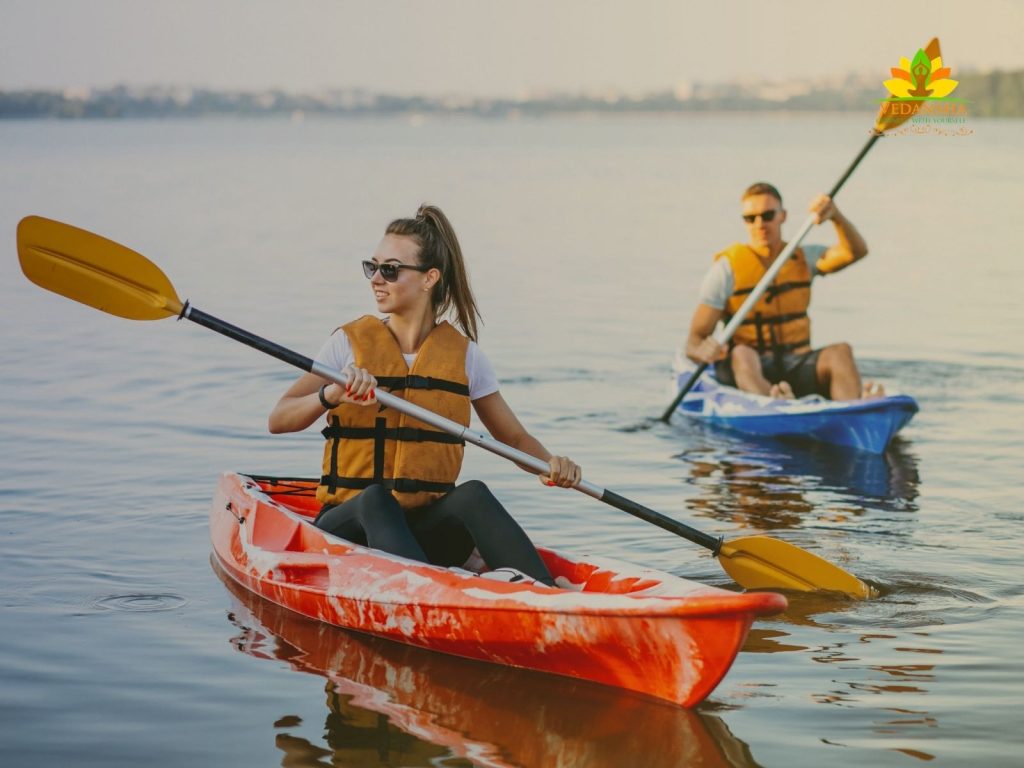
Yoga Retreat Activities
Yoga retreats offer individuals the opportunity to relax, rejuvenate, and connect with their inner selves in a serene and peaceful environment. These retreats often take place in picturesque locations, providing participants with a tranquil setting to deepen their yoga practice and embark on a journey of self-discovery. In this article, we will explore various activities that are typically offered during a yoga retreat, allowing participants to enhance their experience and make the most out of their time away.
Introduction: What are Yoga Retreats?
Yoga retreats are immersive experiences that combine the practice of yoga with various activities and workshops aimed at promoting physical, mental, and spiritual well-being. These retreats are usually held in serene and natural environments, such as beachside resorts, mountain retreat centers, or peaceful countryside locations. They offer participants a break from their daily routines and provide an opportunity to delve deeper into their yoga practice while nurturing their minds, body, and soul.
Daily Yoga Practice

yoga retreats activities
At the heart of any yoga retreat, you will find daily yoga sessions. These sessions are typically led by experienced yoga instructors who guide participants through a variety of asanas (yoga poses), pranayama (breathing exercises), and relaxation techniques. The retreat’s schedule may include multiple yoga classes throughout the day, allowing participants to deepen their practice and explore different styles of yoga.
Guided Meditation Sessions
Meditation is a key component of yoga retreats, as it helps participants cultivate mindfulness and inner peace. Guided meditation sessions are conducted by experienced meditation teachers who lead participants through various meditation techniques, such as breath awareness, visualization, or loving-kindness meditation. These sessions provide a space for individuals to quiet their minds, reduce stress, and enhance their overall well-being.
Mindfulness Workshops
In addition to meditation, yoga retreats often offer mindfulness workshops. These workshops provide participants with practical tools and techniques to cultivate mindfulness in their daily lives. Participants may learn about the importance of present-moment awareness, conscious breathing, and mindful eating. These workshops aim to empower individuals to live more mindfully and develop a deeper connection with themselves and the world around them.
Nature Walks and Hikes

yoga retreats activities
One of the advantages of yoga retreats is the opportunity to connect with nature. Many retreats are located in breathtaking natural settings, allowing participants to embark on nature walks or hikes. These outdoor activities not only provide physical exercise but also allow individuals to immerse themselves in the beauty of their surroundings. Walking mindfully in nature can be a deeply grounding and meditative experience.
Ayurveda and Wellness Workshops
Ayurveda, the ancient Indian system of medicine, is often integrated into yoga retreats. Ayurvedic workshops introduce participants to the principles of this holistic healing system, including personalized nutrition, self-care practices, and daily routines. Participants may learn about their unique dosha (mind-body type) and how to bring balance and harmony to their lives through Ayurvedic practices.
Cooking Classes and Nutritional Talks
Nourishing the body is an essential aspect of any yoga retreat. Cooking classes and nutritional talks are frequently offered to educate participants about healthy eating habits and how to prepare nourishing meals. These sessions may cover topics such as plant-based nutrition, mindful eating, and the benefits of incorporating local and organic foods into one’s diet.
Sound Healing and Chanting

yoga retreats activities
Sound healing and chanting sessions provide participants with an opportunity to experience the therapeutic benefits of sound vibrations. These sessions often involve the use of various instruments like singing bowls, gongs, or drums. Chanting mantras and sacred sounds can have a profound effect on the mind and body, promoting relaxation, focus, and spiritual growth.
Creative Expression Workshops
Yoga retreats recognize the importance of creative expression as a means of self-discovery and personal growth. Creative expression workshops may include activities such as painting, journaling, dancing, or poetry writing. These workshops encourage participants to tap into their innate creativity, fostering a sense of joy, liberation, and self-expression.
Yoga Philosophy Discussions
Yoga retreats delve beyond the physical aspects of the practice, recognizing that yoga encompasses a profound philosophical tradition. As such, these retreats often incorporate discussions on yoga philosophy, delving into ancient texts such as the Yoga Sutras of Patanjali or the Bhagavad Gita. These discussions serve as gateways to the deeper dimensions of yoga, offering participants valuable insights into the profound principles and teachings that underlie the practice.
Exploring the philosophical aspects of yoga allows individuals to cultivate a greater understanding of themselves and their place in the world. It invites self-reflection, introspection, and contemplation, guiding participants on a transformative journey of self-discovery and personal growth. Through these philosophical discussions, individuals gain wisdom and knowledge that extend far beyond physical postures, breathing techniques, and meditation practices.
They gain a holistic understanding of the underlying principles that govern the practice of yoga, unlocking the potential for profound transformation and deepening their connection to the practice. By engaging in these philosophical explorations, participants on yoga retreats embark on a path of self-discovery, expanding their awareness, and nourishing their souls with the timeless wisdom of yoga philosophy.
Outdoor Activities

yoga retreats activities
Yoga retreats go beyond the confines of the yoga studio and often incorporate outdoor activities into their programs. These activities are carefully selected to complement the yoga practice and provide participants with an opportunity to engage with their bodies and the natural environment. Depending on the location of the retreat, a variety of outdoor activities may be offered, such as swimming, paddleboarding, kayaking, or beach volleyball.
Engaging in these activities not only allows participants to stay physically active but also encourages them to connect with nature and fully immerse themselves in the beautiful surroundings. The rhythmic movements of swimming or the peaceful glide of paddleboarding can create a sense of flow and harmony, complementing the meditative aspects of yoga. Kayaking offers a chance to explore serene waters, while beach volleyball brings a playful element, fostering a spirit of camaraderie and friendly competition.
By participating in these outdoor activities, individuals can embrace an active lifestyle, strengthen their bodies, and invigorate their senses. These experiences not only add an element of fun and adventure to the retreat but also contribute to a holistic sense of well-being, allowing participants to connect with their bodies, enjoy the natural beauty around them, and create cherished memories that will last long after the retreat is over.
Spa Treatments and Relaxation
Relaxation and self-care play a crucial role in the experience of a yoga retreat. Recognizing the importance of nurturing the mind, body, and spirit, many retreat centers provide spa facilities where participants can fully indulge in relaxation and rejuvenation. These spa facilities offer a range of treatments, including massages, facials, and other therapeutic therapies. Through the skilled hands of trained professionals, participants can experience the benefits of these treatments firsthand.
Massages help release tension and promote the release of endorphins, allowing for deep relaxation and a sense of tranquility. Facials, on the other hand, not only nourish the skin but also provide an opportunity for participants to unwind and take care of themselves holistically.
These spa treatments not only offer physical benefits but also contribute to the overall well-being of the participants. They create a space for individuals to prioritize self-care, recharge their energy, and embrace a state of blissful relaxation. By incorporating these spa facilities into the yoga retreat experience, participants are provided with an opportunity to nurture themselves, enhance their sense of well-being, and emerge from the retreat feeling refreshed, rejuvenated, and balanced
Community Bonding and Group Activities

yoga retreats activities
Yoga retreats offer a special space where individuals can connect with others who share a similar path and mindset. One of the key elements that facilitate this connection is the organization of group activities and community bonding exercises. These activities are thoughtfully designed to foster connections and create a sense of belonging within the retreat community.
Group discussions provide a platform for participants to share their thoughts, experiences, and insights, creating an atmosphere of open dialogue and mutual understanding. Sharing circles offer a safe and supportive environment where individuals can express themselves authentically and be truly heard and seen by others.
Collaborative projects encourage teamwork and cooperation, allowing participants to engage in joint creative endeavors that deepen their connection with each other. Through these group activities and community bonding exercises, yoga retreats cultivate a sense of unity and a supportive network, enabling individuals to forge meaningful connections, build friendships, and create a lasting sense of community that extends beyond the retreat itself.
Excursions to Local Attractions
Exploring the local surroundings is an integral part of many yoga retreats, adding an extra dimension to the overall experience. Participants have the opportunity to embark on excursions to nearby attractions, which often include visits to ancient temples, breathtaking natural landmarks, and culturally significant sites.
These excursions serve as a gateway to immersing oneself in the local culture, embracing the traditions and customs of the destination. Stepping outside the retreat’s boundaries, participants can witness the beauty of their surroundings firsthand, feeling a deep connection to the place they are in.
These excursions provide a welcome break from the retreat schedule, allowing individuals to unwind, explore, and create lasting memories that will stay with them long after the retreat is over. Whether it’s standing in awe of a historic temple, marveling at the wonders of nature, or engaging with the local community, these excursions offer a valuable opportunity to broaden horizons, gain new perspectives, and infuse the yoga retreat experience with rich cultural and geographical exploration.
Conclusion
Yoga retreats offer a transformative and enriching experience for individuals seeking to deepen their yoga practice and connect with themselves on a deeper level. With a wide range of activities, including daily yoga practice, meditation sessions, nature walks, wellness workshops, and more, participants can tailor their retreat experience to meet their specific needs and preferences. By immersing themselves in this holistic journey, individuals can return home feeling rejuvenated, inspired, and equipped with valuable tools to incorporate into their daily lives.
FAQs
1. How long do yoga retreats typically last? Yoga retreats can vary in duration, ranging from a weekend getaway to several weeks. The length of the retreat depends on the specific program and the goals of the participants.
2. Do I need to be an experienced yogi to join a yoga retreat? Yoga retreats cater to individuals of all levels, from beginners to advanced practitioners. Retreat organizers ensure that sessions are accessible and offer modifications for different skill levels.
3. Can I attend a yoga retreat alone? Yes, many participants attend yoga retreats alone. It can be a wonderful opportunity to embark on a personal journey, meet like-minded individuals, and experience self-discovery in a supportive and nurturing environment.
4. What should I pack for a yoga retreat? It is advisable to pack comfortable yoga attire, a yoga mat, sunscreen, insect repellent, a reusable water bottle, and any personal items you may need. It is best to check with the retreat organizers for specific recommendations.
5. Are yoga retreats only for women? No, yoga retreats are open to people of all genders. They welcome anyone who wishes to explore yoga, deepen their practice, and embrace holistic well-being.
No Comments
Sorry, the comment form is closed at this time.
